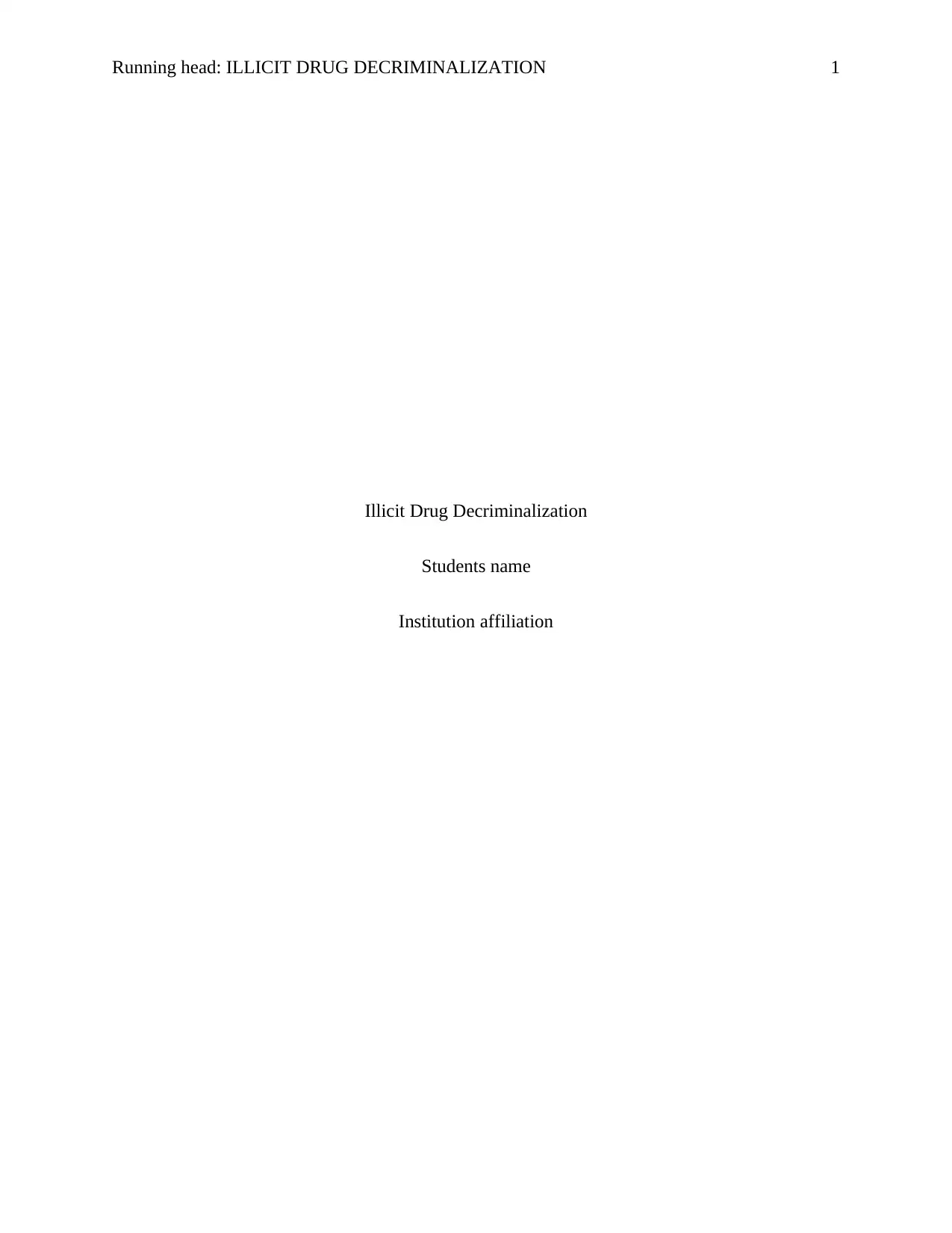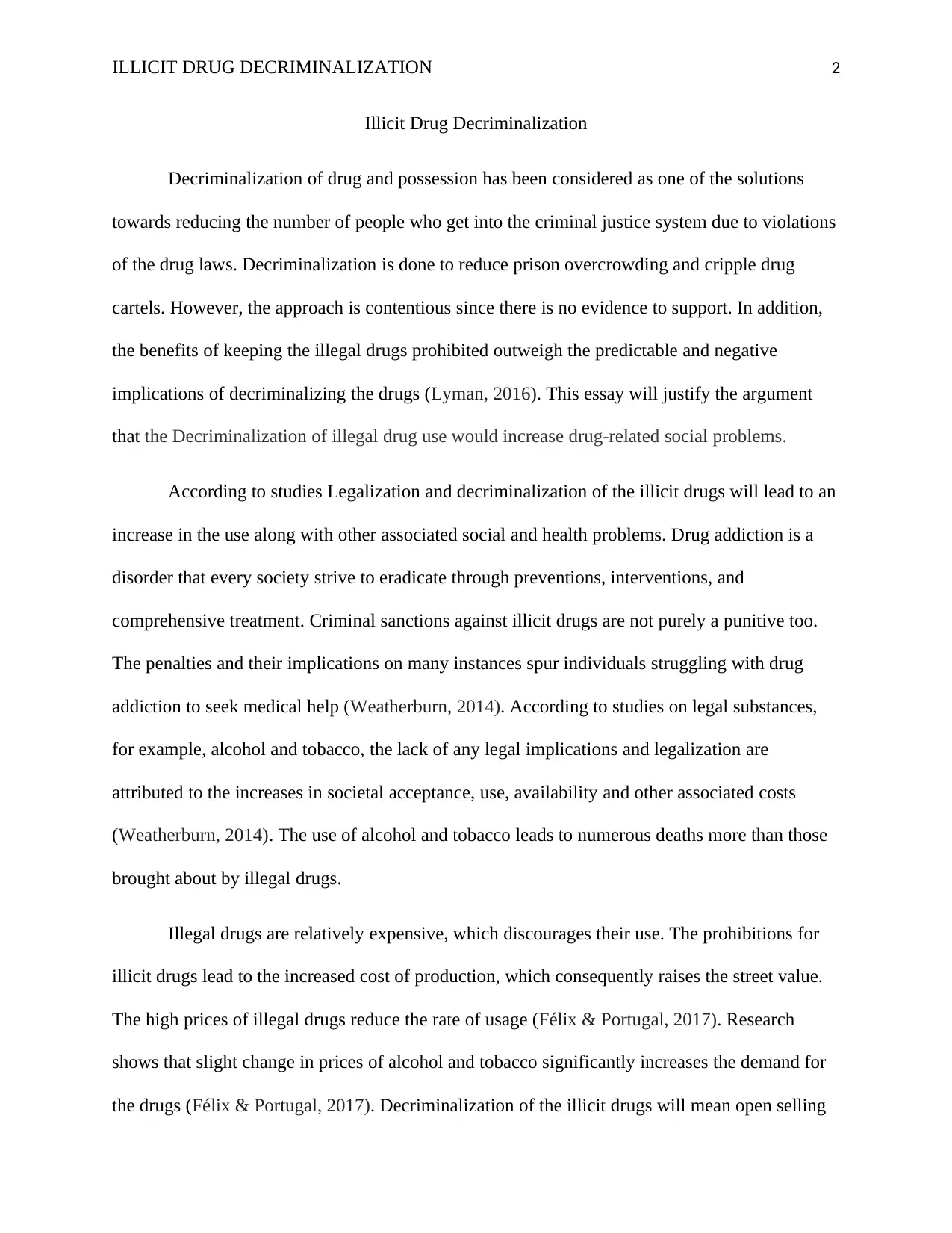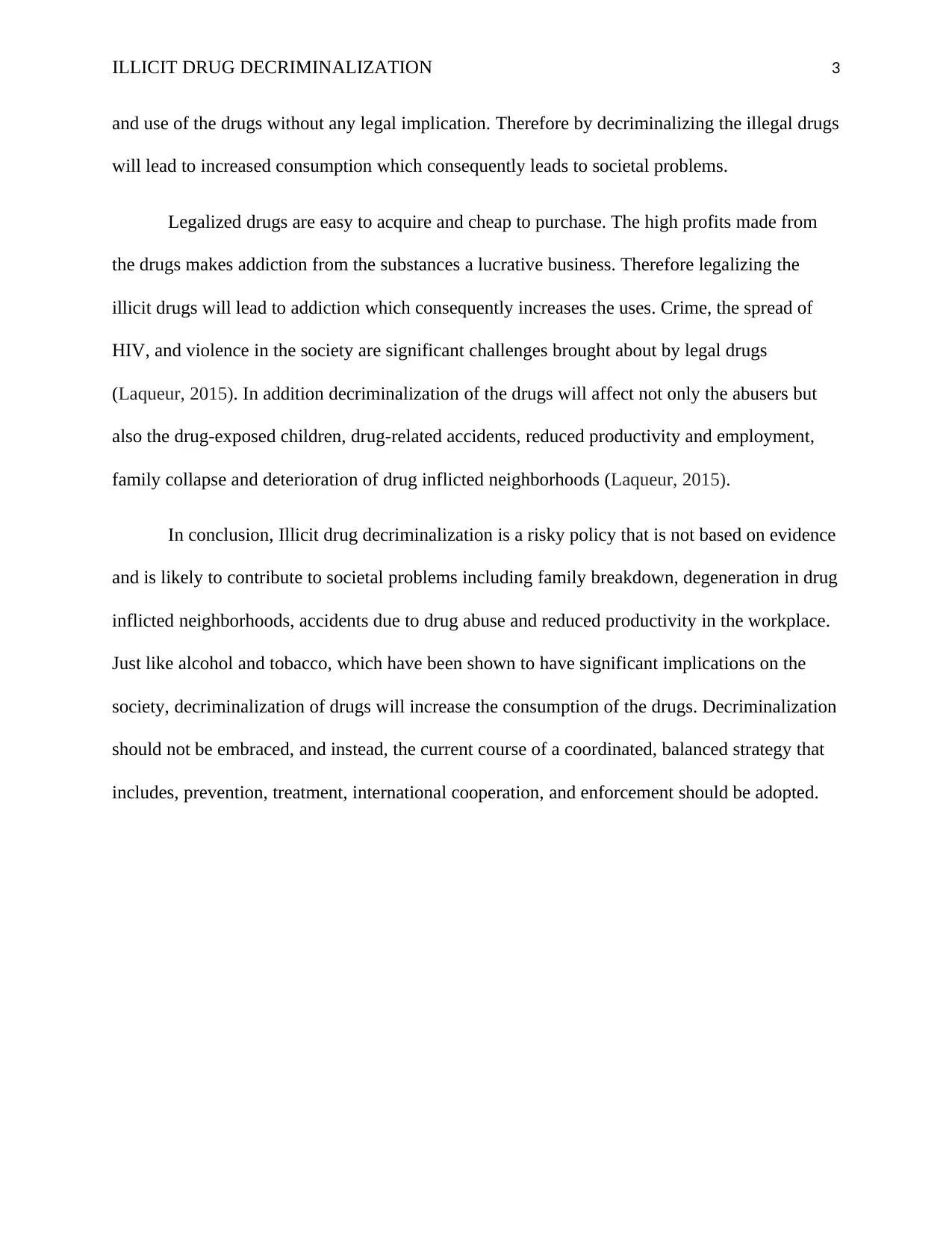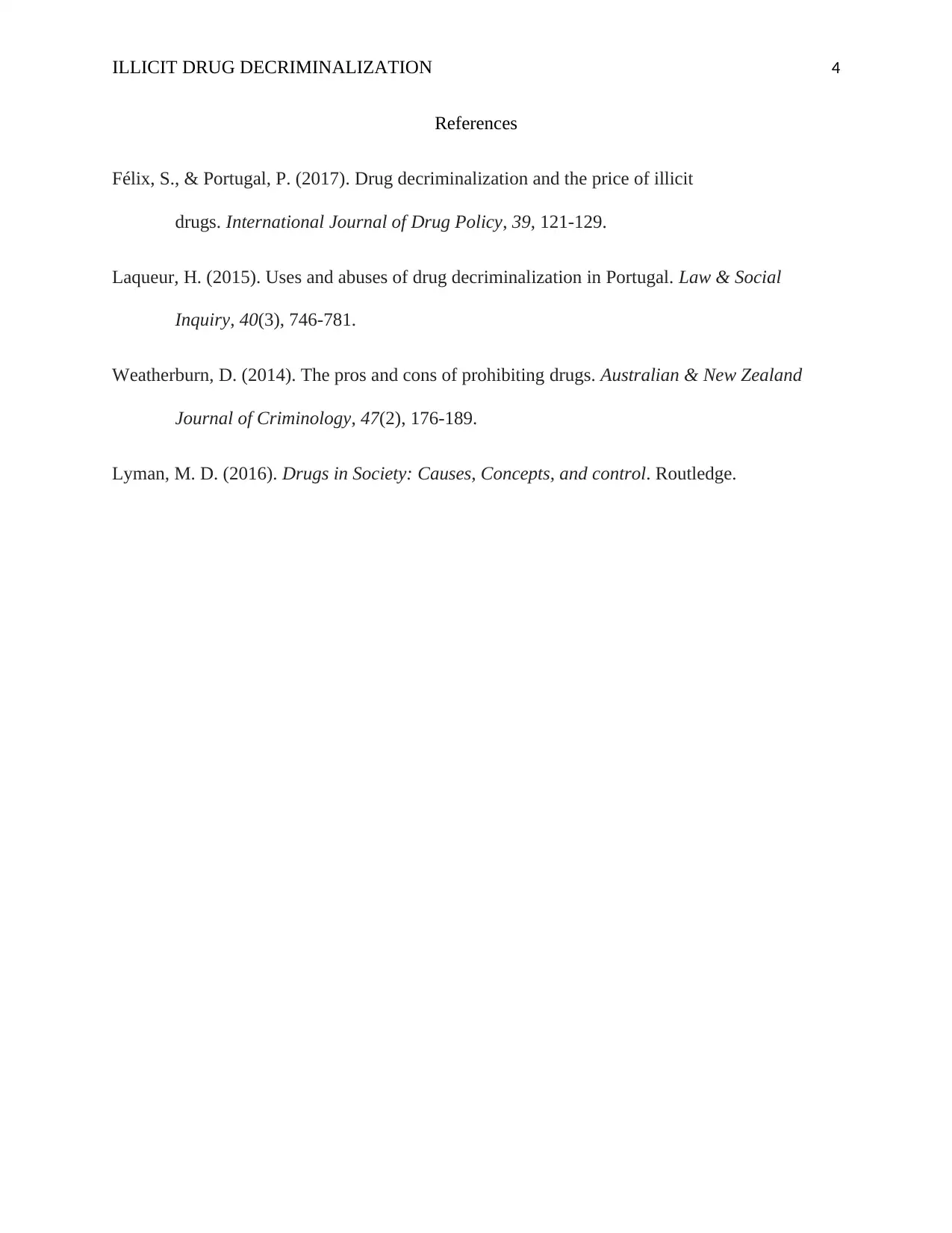Argumentative Essay on Illicit Drug Decriminalization's Impacts
VerifiedAdded on 2022/10/13
|4
|714
|15
Essay
AI Summary
This essay argues against the decriminalization of illicit drugs, claiming it would exacerbate drug-related social problems. The author cites research suggesting that legalization leads to increased use and associated health and societal issues, similar to alcohol and tobacco. The essay highlights potential consequences such as increased addiction, crime, violence, and negative impacts on families, children, and productivity. It emphasizes that the high cost of illegal drugs currently discourages usage, and decriminalization would remove this barrier. The conclusion advocates for a balanced strategy involving prevention, treatment, international cooperation, and enforcement, rather than decriminalization. The author uses multiple sources to support their claims.

Running head: ILLICIT DRUG DECRIMINALIZATION 1
Illicit Drug Decriminalization
Students name
Institution affiliation
Illicit Drug Decriminalization
Students name
Institution affiliation
Paraphrase This Document
Need a fresh take? Get an instant paraphrase of this document with our AI Paraphraser

ILLICIT DRUG DECRIMINALIZATION 2
Illicit Drug Decriminalization
Decriminalization of drug and possession has been considered as one of the solutions
towards reducing the number of people who get into the criminal justice system due to violations
of the drug laws. Decriminalization is done to reduce prison overcrowding and cripple drug
cartels. However, the approach is contentious since there is no evidence to support. In addition,
the benefits of keeping the illegal drugs prohibited outweigh the predictable and negative
implications of decriminalizing the drugs (Lyman, 2016). This essay will justify the argument
that the Decriminalization of illegal drug use would increase drug-related social problems.
According to studies Legalization and decriminalization of the illicit drugs will lead to an
increase in the use along with other associated social and health problems. Drug addiction is a
disorder that every society strive to eradicate through preventions, interventions, and
comprehensive treatment. Criminal sanctions against illicit drugs are not purely a punitive too.
The penalties and their implications on many instances spur individuals struggling with drug
addiction to seek medical help (Weatherburn, 2014). According to studies on legal substances,
for example, alcohol and tobacco, the lack of any legal implications and legalization are
attributed to the increases in societal acceptance, use, availability and other associated costs
(Weatherburn, 2014). The use of alcohol and tobacco leads to numerous deaths more than those
brought about by illegal drugs.
Illegal drugs are relatively expensive, which discourages their use. The prohibitions for
illicit drugs lead to the increased cost of production, which consequently raises the street value.
The high prices of illegal drugs reduce the rate of usage (Félix & Portugal, 2017). Research
shows that slight change in prices of alcohol and tobacco significantly increases the demand for
the drugs (Félix & Portugal, 2017). Decriminalization of the illicit drugs will mean open selling
Illicit Drug Decriminalization
Decriminalization of drug and possession has been considered as one of the solutions
towards reducing the number of people who get into the criminal justice system due to violations
of the drug laws. Decriminalization is done to reduce prison overcrowding and cripple drug
cartels. However, the approach is contentious since there is no evidence to support. In addition,
the benefits of keeping the illegal drugs prohibited outweigh the predictable and negative
implications of decriminalizing the drugs (Lyman, 2016). This essay will justify the argument
that the Decriminalization of illegal drug use would increase drug-related social problems.
According to studies Legalization and decriminalization of the illicit drugs will lead to an
increase in the use along with other associated social and health problems. Drug addiction is a
disorder that every society strive to eradicate through preventions, interventions, and
comprehensive treatment. Criminal sanctions against illicit drugs are not purely a punitive too.
The penalties and their implications on many instances spur individuals struggling with drug
addiction to seek medical help (Weatherburn, 2014). According to studies on legal substances,
for example, alcohol and tobacco, the lack of any legal implications and legalization are
attributed to the increases in societal acceptance, use, availability and other associated costs
(Weatherburn, 2014). The use of alcohol and tobacco leads to numerous deaths more than those
brought about by illegal drugs.
Illegal drugs are relatively expensive, which discourages their use. The prohibitions for
illicit drugs lead to the increased cost of production, which consequently raises the street value.
The high prices of illegal drugs reduce the rate of usage (Félix & Portugal, 2017). Research
shows that slight change in prices of alcohol and tobacco significantly increases the demand for
the drugs (Félix & Portugal, 2017). Decriminalization of the illicit drugs will mean open selling

ILLICIT DRUG DECRIMINALIZATION 3
and use of the drugs without any legal implication. Therefore by decriminalizing the illegal drugs
will lead to increased consumption which consequently leads to societal problems.
Legalized drugs are easy to acquire and cheap to purchase. The high profits made from
the drugs makes addiction from the substances a lucrative business. Therefore legalizing the
illicit drugs will lead to addiction which consequently increases the uses. Crime, the spread of
HIV, and violence in the society are significant challenges brought about by legal drugs
(Laqueur, 2015). In addition decriminalization of the drugs will affect not only the abusers but
also the drug-exposed children, drug-related accidents, reduced productivity and employment,
family collapse and deterioration of drug inflicted neighborhoods (Laqueur, 2015).
In conclusion, Illicit drug decriminalization is a risky policy that is not based on evidence
and is likely to contribute to societal problems including family breakdown, degeneration in drug
inflicted neighborhoods, accidents due to drug abuse and reduced productivity in the workplace.
Just like alcohol and tobacco, which have been shown to have significant implications on the
society, decriminalization of drugs will increase the consumption of the drugs. Decriminalization
should not be embraced, and instead, the current course of a coordinated, balanced strategy that
includes, prevention, treatment, international cooperation, and enforcement should be adopted.
and use of the drugs without any legal implication. Therefore by decriminalizing the illegal drugs
will lead to increased consumption which consequently leads to societal problems.
Legalized drugs are easy to acquire and cheap to purchase. The high profits made from
the drugs makes addiction from the substances a lucrative business. Therefore legalizing the
illicit drugs will lead to addiction which consequently increases the uses. Crime, the spread of
HIV, and violence in the society are significant challenges brought about by legal drugs
(Laqueur, 2015). In addition decriminalization of the drugs will affect not only the abusers but
also the drug-exposed children, drug-related accidents, reduced productivity and employment,
family collapse and deterioration of drug inflicted neighborhoods (Laqueur, 2015).
In conclusion, Illicit drug decriminalization is a risky policy that is not based on evidence
and is likely to contribute to societal problems including family breakdown, degeneration in drug
inflicted neighborhoods, accidents due to drug abuse and reduced productivity in the workplace.
Just like alcohol and tobacco, which have been shown to have significant implications on the
society, decriminalization of drugs will increase the consumption of the drugs. Decriminalization
should not be embraced, and instead, the current course of a coordinated, balanced strategy that
includes, prevention, treatment, international cooperation, and enforcement should be adopted.
⊘ This is a preview!⊘
Do you want full access?
Subscribe today to unlock all pages.

Trusted by 1+ million students worldwide

ILLICIT DRUG DECRIMINALIZATION 4
References
Félix, S., & Portugal, P. (2017). Drug decriminalization and the price of illicit
drugs. International Journal of Drug Policy, 39, 121-129.
Laqueur, H. (2015). Uses and abuses of drug decriminalization in Portugal. Law & Social
Inquiry, 40(3), 746-781.
Weatherburn, D. (2014). The pros and cons of prohibiting drugs. Australian & New Zealand
Journal of Criminology, 47(2), 176-189.
Lyman, M. D. (2016). Drugs in Society: Causes, Concepts, and control. Routledge.
References
Félix, S., & Portugal, P. (2017). Drug decriminalization and the price of illicit
drugs. International Journal of Drug Policy, 39, 121-129.
Laqueur, H. (2015). Uses and abuses of drug decriminalization in Portugal. Law & Social
Inquiry, 40(3), 746-781.
Weatherburn, D. (2014). The pros and cons of prohibiting drugs. Australian & New Zealand
Journal of Criminology, 47(2), 176-189.
Lyman, M. D. (2016). Drugs in Society: Causes, Concepts, and control. Routledge.
1 out of 4
Related Documents
Your All-in-One AI-Powered Toolkit for Academic Success.
+13062052269
info@desklib.com
Available 24*7 on WhatsApp / Email
![[object Object]](/_next/static/media/star-bottom.7253800d.svg)
Unlock your academic potential
Copyright © 2020–2026 A2Z Services. All Rights Reserved. Developed and managed by ZUCOL.





